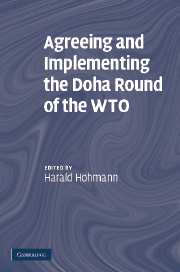Book contents
- Frontmatter
- Contents
- List of Contributors
- Foreword
- Introduction
- The future of the Doha Round
- PART ONE Development policy of the WTO
- PART TWO Trade policy (including competition) and trade facilitation
- PART THREE Reform of the dispute settlement system
- 11 Reforming the dispute settlement system through practice
- 12 Reforming the Dispute Settlement Understanding
- 13 The WTO dispute settlement system: Jurisdiction, interpretation and remedies
- 14 An evaluation of the role of legal aid in international dispute resolution, with emphasis on the Advisory Centre on WTO Law
- PART FOUR Social rights, health, and environment
- PART FIVE Conclusions
- Index
13 - The WTO dispute settlement system: Jurisdiction, interpretation and remedies
from PART THREE - Reform of the dispute settlement system
Published online by Cambridge University Press: 23 February 2010
- Frontmatter
- Contents
- List of Contributors
- Foreword
- Introduction
- The future of the Doha Round
- PART ONE Development policy of the WTO
- PART TWO Trade policy (including competition) and trade facilitation
- PART THREE Reform of the dispute settlement system
- 11 Reforming the dispute settlement system through practice
- 12 Reforming the Dispute Settlement Understanding
- 13 The WTO dispute settlement system: Jurisdiction, interpretation and remedies
- 14 An evaluation of the role of legal aid in international dispute resolution, with emphasis on the Advisory Centre on WTO Law
- PART FOUR Social rights, health, and environment
- PART FIVE Conclusions
- Index
Summary
WTO – An integral part of public international law
WTO law does not exist in a vacuum; it is part of international law. The Appellate Body emphasised, in its very first case, that the provisions of the Marrakesh Agreement Establishing the World Trade Organization (the WTO Agreement) are not to be read in ‘clinical isolation’ from public international law. What status does ‘non-WTO law’ – customary international law, general international law or treaties between parties to a dispute – have in WTO dispute settlement? Can WTO panels and the Appellate Body take ‘non-WTO’ international legal rules into account in deciding a case under the WTO Agreement, and if so, what status should they be accorded?
Jurisdiction of the WTO
In the WTO, the Understanding on Rules and Procedures Governing the Settlement of Disputes (the ‘DSU’) applies only to ‘disputes brought pursuant to the consultation and dispute settlement provisions of the agreements listed in Appendix 1 to the Understanding’ (the ‘covered agreements’). Therefore, under the DSU, WTO panels and the Appellate Body have jurisdiction to hear cases involving ‘claims’ brought under the dispute settlement provisions of the covered agreements. Claims may be based on allegations of violations of specific obligations contained in the covered agreements or involve so-called ‘non-violation’ complaints or ‘situation’ complaints.
The WTO is one of the few international dispute resolution mechanisms that has compulsory jurisdiction over disputes arising under its covered agreements. A panel will be established by the Dispute Settlement Body of the WTO (the ‘DSB’) upon the request of a complaining party, unless there is a consensus to the contrary.
- Type
- Chapter
- Information
- Agreeing and Implementing the Doha Round of the WTO , pp. 294 - 307Publisher: Cambridge University PressPrint publication year: 2008
- 1
- Cited by

